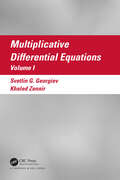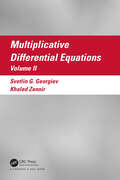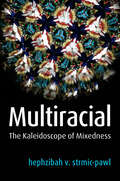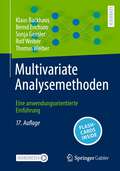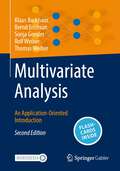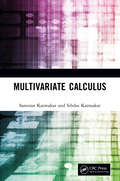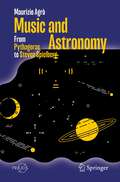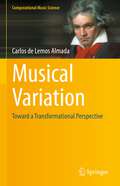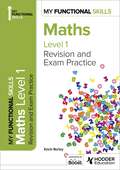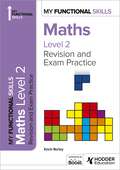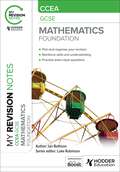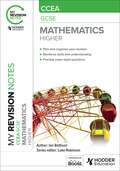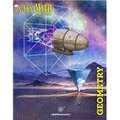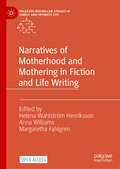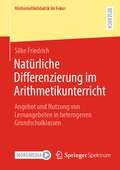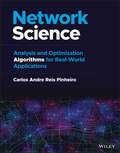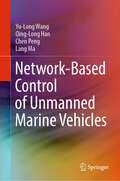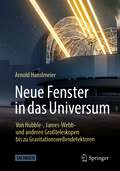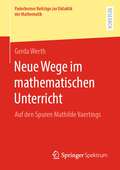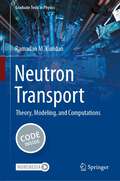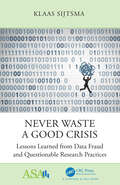- Table View
- List View
Multiplicative Differential Equations: Volume I
by Svetlin G. Georgiev Khaled ZennirMultiplicative Differential Equations: Volume I is the first part of a comprehensive approach to the subject. It continues a series of books written by the authors on multiplicative, geometric approaches to key mathematical topics. This volume begins with a basic introduction to multiplicative differential equations and then moves on to first- and second-order equations, as well as the question of existence and uniqueness of solutions. Each chapter ends with a section of practical problems. The book is accessible to graduate students and researchers in mathematics, physics, engineering and biology.
Multiplicative Differential Equations: Volume II
by Svetlin Georgiev Khaled ZennirMultiplicative Differential Equations: Volume II is the second part of a comprehensive approach to the subject. It continues a series of books written by the authors on multiplicative, geometric approaches to key mathematical topics. This volume is devoted to the theory of multiplicative differential systems. The asymptotic behavior of the solutions of such systems is studied. Stability theory for multiplicative linear and nonlinear systems is introduced and boundary value problems for second-order multiplicative linear and nonlinear equations are explored. The authors also present first-order multiplicative partial differential equations. Each chapter ends with a section of practical problems. The text is accessible to graduate students and researchers in mathematics, physics, engineering and biology.
Multiracial: The Kaleidoscope of Mixedness
by hephzibah v. strmic-pawlThe year 2000 was the first time the US Census permitted respondents to choose more than one race. Although the US has long recognized that a &“mixed-race&” population exists, the contemporary &“multiracial population&” presents different questions and implications for today&’s diverse society. This book is the first overview to bring a systematic critical race lens to the scholarship on mixedness. Avoiding the common pitfall of conflating &“mixed&” with &“multiracial,&” the book reveals how identity forms and fluctuates such that people with mixed heritage may identify as mixed, monoracial, and/or multiracial throughout their lives. It analyzes the dynamic and various manifestations of mixedness, including at the global level, to reveal its complex impact on both the structural and individual levels. Multiracial critically examinestopics such as family dynamics and racial socialization, multiraciality in media and popular culture, and intersections of race, gender, class, and sexual orientation. Integrating diverse theories, qualitative research, and national-level data, this accessible and engaging book is essential for students of race and those looking to understand the new field of multiraciality.
Multivariate Analysemethoden: Eine anwendungsorientierte Einführung
by Klaus Backhaus Rolf Weiber Bernd Erichson Thomas Weiber Sonja GenslerWir leben in einer Welt der Daten. Daten allein aber sind wertlos, wenn wir nicht in der Lage sind, aus ihnen Informationen zu gewinnen. Um Informationen aus Daten zu extrahieren, sind Methoden der multivariaten Datenanalyse unerlässlich.Dieses Buch bietet eine leicht verständliche Einführung in die wichtigsten Methoden der multivariaten Datenanalyse. Es ist anwendungsorientiert, erfordert nur wenige Kenntnisse in Mathematik und Statistik, demonstriert die Verfahren mit numerischen Beispielen und veranschaulicht jede Methode anhand eines ausführlichen Fallbeispiels. Für Interessierte werden im Einführungskapitel für alle Verfahren relevante statistische Grundlagen aufgefrischt. Für die 17. Auflage wurden alle Kapitel überprüft und mit der aktuellen Version von IBM SPSS gerechnet.Der InhaltEinführung in die empirische Datenanalyse – Regressionsanalyse – Varianzanalyse – Diskriminanzanalyse – Logistische Regression – Kontingenzanalyse – Faktorenanalyse – Clusteranalyse – Conjoint-AnalyseDas Buch wurde 2015 vom Berufsverband Deutscher Markt- und Sozialforscher (BVM) als das Lehrbuch ausgezeichnet, das die deutsche Marktforschungspraxis in den letzten Jahrzehnten nachhaltig geprägt hat. Es ist auch in Englisch und Chinesisch erschienen.Auf der Webseite www.multivariate-methods.info werden weitere Materialien (bspw. Excel-Beispiele, R Code) angeboten, durch die sich die Verfahren noch besser erschließen und vertiefen lassen. Interaktive Flashcards helfen den eigenen Lernfortschritt zu kontrollieren. Mit der Springer Nature Flashcards-App können Sie exklusive Inhalte nutzen und Ihr Wissen testen.
Multivariate Analysis: An Application-Oriented Introduction
by Klaus Backhaus Rolf Weiber Bernd Erichson Thomas Weiber Sonja GenslerData can be extremely valuable if we are able to extract information from them. This is why multivariate data analysis is essential for business and science. This book offers an easy-to-understand introduction to the most relevant methods of multivariate data analysis. It is strictly application-oriented, requires little knowledge of mathematics and statistics, demonstrates the procedures with numerical examples and illustrates each method via a case study solved with IBM’s statistical software package SPSS. Extensions of the methods and links to other procedures are discussed and recommendations for application are given. An introductory chapter presents the basic ideas of the multivariate methods covered in the book and refreshes statistical basics which are relevant to all methods.For the 2nd edition, all chapters were checked and calculated using the current version of IBM SPSS.ContentsIntroduction to empirical data analysisRegression analysisAnalysis of varianceDiscriminant analysisLogistic regression Contingency analysisFactor analysisCluster analysisConjoint analysisThe original German version is now available in its 17th edition. In 2015, this book was honored by the Federal Association of German Market and Social Researchers as “the textbook that has shaped market research and practice in German-speaking countries”. A Chinese version is available in its 3rd edition.On the website www.multivariate-methods.info, the authors further analyze the data with Excel and R and provide additional material to facilitate the understanding of the different multivariate methods. In addition, interactive flashcards are available to the reader for reviewing selected focal points. Download the Springer Nature Flashcards App and use exclusive content to test your knowledge.
Multivariate Calculus
by Sibdas Karmakar Samiran KarmakarThis book is a compilation of all basic topics on functions of Several Variables and is primarily meant for undergraduate and post graduate students. Topics covered are: Limits, continuities and differentiabilities of functions of several variables. Properties of Implicit functions and Jacobians. Extreme values of multivariate functions. Various types of integrals in planes and surfaces and their related theorems including Dirichlet and Liouville’s extension to Dirichlet. Print edition not for sale in South Asia (India, Sri Lanka, Nepal, Bangladesh, Pakistan or Bhutan)
Music and Astronomy: From Pythagoras to Steven Spielberg (Springer Praxis Books)
by Maurizio AgròThis book explores the profound and ancient relationship between music and astronomy. Throughout history, Music has occupied a significant place among the disciplines of the Quadrivium, which also include Geometry, Arithmetic, and Astronomy. The captivating bond between these two realms has not only inspired eminent scientists like Kepler, Newton, and Einstein, but has also captured the imagination of NASA and astronauts in modern times. The author delves into various aspects of the intersection between music and astronomy, encompassing everything from ancient cosmological beliefs to groundbreaking discoveries such as the cosmic background radiation and gravitational waves. This enthralling theme has not only stimulated renowned artists like David Bowie and Elton John, but has also served as a muse for movies like Close Encounters of the Third Kind. Within the book, readers will find an extensive photo gallery and a specially curated soundtrack that enhances the reading experience. It caters to a broad audience, appealing to those with a general interest in both music and astronomy, as well as to specialized individuals in either field of study.
Musical Variation: Toward a Transformational Perspective (Computational Music Science)
by Carlos de AlmadaThis book offers an in-depth analysis of musical variation through a systematic approach, heavily influenced by the principles of Grundgestalt and developed variations, both created by the Austrian composer Arnold Schoenberg (1874-1951). The author introduces a new transformational-derivative model and the theory that supports it, specifically crafted for the examination of tonal music.The idea for this book emerged during a sabbatical at Columbia University, while the content is the product of extensive research conducted at the Federal University of Rio de Janeiro, resulting in the development of the Model of Derivative Analysis. This model places emphasis on the connections between musical entities rather than viewing them as separate entities. As a case study, the Intermezzo in A Major Op.118/2 by Brahms is selected for analysis.The author's goal is to provide a formal and structured approach while maintaining the text's readability and appeal for both musicians and mathematicians in the field of music theory. The book concludes with the author's recommendations for further research.
My Functional Skills: Revision and Exam Practice for Maths Level 1
by Kevin NorleyTarget success in Level 1 Maths with this brand-new functional skills revision and exam practice guide.Suitable for all functional skills courses, this guide explains the key content you need to understand the topics on your course, so you can revise effectively and practise for your exams with the types of questions you will be asked.Now I get it! Grasp even the most difficult topics with clear and simple explanations and questions to test your understandingHow do I answer this? Learn how to unpick the types of exam questions you will face with clear guidance on how to structure your answersSo what do I need to do to pass? Improve your exam skills with hundreds of practice questions for you to try, as well as worked examples and model answers to check you are on the path to successWith a revision planner, exam countdown timetable to help you pace your revision and glossary of all key terms, My Functional Skills has all you need to approach your exams with real confidence.
My Functional Skills: Revision and Exam Practice for Maths Level 1
by Kevin NorleyTarget success in Level 1 Maths with this brand-new functional skills revision and exam practice guide.Suitable for all functional skills courses, this guide explains the key content you need to understand the topics on your course, so you can revise effectively and practise for your exams with the types of questions you will be asked.Now I get it! Grasp even the most difficult topics with clear and simple explanations and questions to test your understandingHow do I answer this? Learn how to unpick the types of exam questions you will face with clear guidance on how to structure your answersSo what do I need to do to pass? Improve your exam skills with hundreds of practice questions for you to try, as well as worked examples and model answers to check you are on the path to successWith a revision planner, exam countdown timetable to help you pace your revision and glossary of all key terms, My Functional Skills has all you need to approach your exams with real confidence.
My Functional Skills: Revision and Exam Practice for Maths Level 2
by Kevin NorleyTarget success in Level 2 Maths with this brand-new functional skills revision and exam practice guide.Suitable for all functional skills courses, this guide explains the key content you need to understand the topics on your course, so you can revise effectively and practise for your exams with the types of questions you will be asked.Now I get it! Grasp even the most difficult topics with clear and simple explanations and questions to test your understanding How do I answer this? Learn how to unpick the types of exam questions you will face with clear guidance on how to structure your answersSo what do I need to do to pass? Improve your exam skills with hundreds of practice questions for you to try, as well as worked examples and model answers to check you are on the path to successWith a revision planner, exam countdown timetable to help you pace your revision and glossary of all key terms, My Functional Skills has all you need to approach your exams with real confidence.
My Functional Skills: Revision and Exam Practice for Maths Level 2
by Kevin NorleyTarget success in Level 2 Maths with this brand-new functional skills revision and exam practice guide.Suitable for all functional skills courses, this guide explains the key content you need to understand the topics on your course, so you can revise effectively and practise for your exams with the types of questions you will be asked.Now I get it! Grasp even the most difficult topics with clear and simple explanations and questions to test your understanding How do I answer this? Learn how to unpick the types of exam questions you will face with clear guidance on how to structure your answersSo what do I need to do to pass? Improve your exam skills with hundreds of practice questions for you to try, as well as worked examples and model answers to check you are on the path to successWith a revision planner, exam countdown timetable to help you pace your revision and glossary of all key terms, My Functional Skills has all you need to approach your exams with real confidence.
My Revision Notes: CCEA GCSE Mathematics Foundation
by Ian BettisonSet your students on track to achieve the best grade possible with My Revision Notes: CCEA GCSE Mathematics FoundationOur clear and concise approach to revision will help students learn, practise and apply their skills and understanding. Coverage of key content is combined with practical study tips, exam-style questions and effective revision strategies to create a guide that can be relied on to build both knowledge and confidence.With My Revision Notes: CCEA GCSE Mathematics, students can:- Consolidate knowledge with clear, focused and relevant content coverage, based on what examiners are looking for- Plan your revision effectively with diagnostic tests for the three main subject areas- Embed skills with 'Practise your revision' questions, and use the full worked solutions to improve your understanding and presentation for the exam- Improve technique through exam-style practice questions, expert tips and examples of typical mistakes to avoid- Plan and manage a successful revision programme with our topic-by-topic planner, exam breakdown feature, user-friendly definitions throughout and questions and answers online
My Revision Notes: CCEA GCSE Mathematics Foundation
by Ian BettisonSet your students on track to achieve the best grade possible with My Revision Notes: CCEA GCSE Mathematics FoundationOur clear and concise approach to revision will help students learn, practise and apply their skills and understanding. Coverage of key content is combined with practical study tips, exam-style questions and effective revision strategies to create a guide that can be relied on to build both knowledge and confidence.With My Revision Notes: CCEA GCSE Mathematics, students can:- Consolidate knowledge with clear, focused and relevant content coverage, based on what examiners are looking for- Plan your revision effectively with diagnostic tests for the three main subject areas- Embed skills with 'Practise your revision' questions, and use the full worked solutions to improve your understanding and presentation for the exam- Improve technique through exam-style practice questions, expert tips and examples of typical mistakes to avoid- Plan and manage a successful revision programme with our topic-by-topic planner, exam breakdown feature, user-friendly definitions throughout and questions and answers online
My Revision Notes: CCEA GCSE Mathematics Higher
by Ian BettisonSet your students on track to achieve the best grade possible with My Revision Notes: CCEA GCSE Mathematics HigherOur clear and concise approach to revision will help students learn, practise and apply their skills and understanding. Coverage of key content is combined with practical study tips, exam-style questions and effective revision strategies to create a guide that can be relied on to build both knowledge and confidence.With My Revision Notes: CCEA GCSE Mathematics, students can: Consolidate knowledge with clear, focused and relevant content coverage, based on what examiners are looking for Plan your revision effectively with diagnostic tests for the three main subject areas Embed skills with 'Practise your revision' questions, and use the full worked solutions to improve your understanding and presentation for the exam Improve technique through exam-style practice questions, expert tips and examples of typical mistakes to avoid Plan and manage a successful revision programme with our topic-by-topic planner, exam breakdown feature, user-friendly definitions throughout and questions and answers online
My Revision Notes: CCEA GCSE Mathematics Higher
by Ian BettisonSet your students on track to achieve the best grade possible with My Revision Notes: CCEA GCSE Mathematics HigherOur clear and concise approach to revision will help students learn, practise and apply their skills and understanding. Coverage of key content is combined with practical study tips, exam-style questions and effective revision strategies to create a guide that can be relied on to build both knowledge and confidence.With My Revision Notes: CCEA GCSE Mathematics, students can: Consolidate knowledge with clear, focused and relevant content coverage, based on what examiners are looking for Plan your revision effectively with diagnostic tests for the three main subject areas Embed skills with 'Practise your revision' questions, and use the full worked solutions to improve your understanding and presentation for the exam Improve technique through exam-style practice questions, expert tips and examples of typical mistakes to avoid Plan and manage a successful revision programme with our topic-by-topic planner, exam breakdown feature, user-friendly definitions throughout and questions and answers online
Narratives of Motherhood and Mothering in Fiction and Life Writing (Palgrave Macmillan Studies in Family and Intimate Life)
by Anna Williams Helena Wahlström Henriksson Margaretha FahlgrenThis open access volume offers original essays on how motherhood and mothering are represented in contemporary fiction and life writing across several national contexts. Providing a broad range of perspectives in terms of geopolitical places, thematic concerns, and theoretical and interdisciplinary approaches, it demonstrates the significance of literary narratives for understanding and critiquing motherhood and mothering as social phenomena and subjective experiences. The chapters contextualize motherhood and mothering in terms of their particular national and cultural location and analyze narratives about mothers who are firmly placed in one national context, as well as those who are in “in-between” positions due to migrant experiences. The contributions foreground and link together the themes central to the volume: embodied experience and maternal embodiment; notions of what is “normal” or natural (or not) about motherhood; maternal health and illness; mother-daughter relations; maternality and memory; and the (im)possibilities of giving voice to the mother. They raise questions about how motherhood and mothering are marked by absence and/or presence, as well as by profound ambivalences.
Natürliche Differenzierung im Arithmetikunterricht: Angebot und Nutzung von Lernangeboten in heterogenen Grundschulklassen (Mathematikdidaktik im Fokus)
by Silke FriedrichIn der aktuellen mathematikdidaktischen Diskussion wird das Konzept der natürlichen Differenzierung als eine adäquate Möglichkeit angesehen, mit heterogenen Lerngruppen umzugehen. Natürliche Differenzierung ermöglicht Lernenden das gemeinsame Arbeiten an einem Lerngegenstand auf unterschiedlichen Schwierigkeitsniveaus. Die Studie wurde im Mathematikunterricht dritter Klassen am Beispiel des Lernangebots „Kombi-Gleichungen“ durchgeführt. Dabei wurde empirisch untersucht, ob Lernende einer heterogenen Lerngruppe ein natürlich differenzierendes arithmetisches Lernangebot tatsächlich ihrem individuellen Lernpotenzial entsprechend nutzen.
Network Science: Analysis and Optimization Algorithms for Real-World Applications
by Carlos Andre PinheiroNetwork Science Network Science offers comprehensive insight on network analysis and network optimization algorithms, with simple step-by-step guides and examples throughout, and a thorough introduction and history of network science, explaining the key concepts and the type of data needed for network analysis, ensuring a smooth learning experience for readers. It also includes a detailed introduction to multiple network optimization algorithms, including linear assignment, network flow and routing problems. The text is comprised of five chapters, focusing on subgraphs, network analysis, network optimization, and includes a list of case studies, those of which include influence factors in telecommunications, fraud detection in taxpayers, identifying the viral effect in purchasing, finding optimal routes considering public transportation systems, among many others. This insightful book shows how to apply algorithms to solve complex problems in real-life scenarios and shows the math behind these algorithms, enabling readers to learn how to develop them and scrutinize the results. Written by a highly qualified author with significant experience in the field, Network Science also includes information on: Sub-networks, covering connected components, bi-connected components, community detection, k-core decomposition, reach network, projection, nodes similarity and pattern matching Network centrality measures, covering degree, influence, clustering coefficient, closeness, betweenness, eigenvector, PageRank, hub and authority Network optimization, covering clique, cycle, linear assignment, minimum-cost network flow, maximum network flow problem, minimum cut, minimum spanning tree, path, shortest path, transitive closure, traveling salesman problem, vehicle routing problem and topological sort With in-depth and authoritative coverage of the subject and many case studies to convey concepts clearly, Network Science is a helpful training resource for professional and industry workers in, telecommunications, insurance, retail, banking, healthcare, public sector, among others, plus as a supplementary reading for an introductory Network Science course for undergraduate students.
Network-Based Control of Unmanned Marine Vehicles
by Chen Peng Qing-Long Han Yu-Long Wang Lang MaThis book presents a comprehensive analysis of stability, stabilization, and fault detection in networked control systems, with a focus on unmanned marine vehicles. It investigates the challenges of network-based control in areas like heading control, fault detection filter and controller design, dynamic positioning, and cooperative target tracking. Communication networks in control systems can induce delays and dropouts, so the book presents the importance of stability analysis, stabilize, and fault detection. To help readers gain a deeper understanding of these concepts, the book provides fundamental concepts and real-world examples. This book is a valuable resource for researchers and practitioners working in the field of network-based control for unmanned marine vehicles.
Neue Fenster in das Universum: Von Hubble-, James-Webb- und anderen Großteleskopen bis zu Gravitationswellendetektoren
by Arnold HanslmeierDie Beobachtungsmöglichkeiten der modernen Astrophysik werden immer zahlreicher. Sie reichen von optischen Teleskopen über Weltraumteleskope im Infraroten bis zu Radioteleskopen und von Gravitationswellendetektoren bis hin zu Neutrinoobservatorien. Während die einen im Weltraum ein Augenmerk auf das Licht werfen, nehmen andere unter Wasser kleinste Teilchen unter die Lupe oder messen Störungen der Raumzeit, die kleiner sind als der Durchmesser eines Protons. Das Buch bietet einen spannenden umfassenden Überblick über unsere technischen Möglichkeiten, das Universum zu erforschen. Als Grundlage für eine Vorlesung in Astronomie bzw. Astrophysik ist es ebenso geeignet wie als Lektüre für naturwissenschaftlich Interessierte.
Neue Wege im mathematischen Unterricht: Auf den Spuren Mathilde Vaertings (Paderborner Beiträge zur Didaktik der Mathematik)
by Gerda WerthMathilde Vaerting (1884 – 1977) möchte den Mathematikunterricht ihrer Zeit radikal verändern und mit ihrer Methode der „Selbständigkeitsprobe“ einen Weg aufzeigen, Schüler*innen durch geeignete kognitive Anregung zu eigenständigem Denken zu motivieren. Ihre „Neue[n] Wege im mathematischen Unterricht“ aus 1921 schließen dabei explizit Mädchen ein, obwohl diesen, nachdem sie seit 1908 endlich auch Mathematik an Schulen lernen durften, die Begabung für dieses Fach vielfach abgesprochen wurde. Das Buch arbeitet ihre didaktischen Konzepte sowie die schulischen und curricularen Rahmenbedingungen auf, auch in Bezug auf die Lehrerinnenbildung der damaligen Zeit.
Neutron Transport: Theory, Modeling, and Computations (Graduate Texts in Physics)
by Ramadan M. KuridanThis textbook provides a thorough explanation of the physical concepts and presents the general theory of different forms through approximations of the neutron transport processes in nuclear reactors and emphasize the numerical computing methods that lead to the prediction of neutron behavior. Detailed derivations and thorough discussions are the prominent features of this book unlike the brevity and conciseness which are the characteristic of most available textbooks on the subject where students find them difficult to follow. This conclusion has been reached from the experience gained through decades of teaching. The topics covered in this book are suitable for senior undergraduate and graduate students in the fields of nuclear engineering and physics. Other engineering and science students may find the construction and methodology of tackling problems as presented in this book appealing from which they can benefit in solving other problems numerically. The book provides access to a one dimensional, two energy group neutron diffusion program including a user manual, examples, and test problems for student practice. An option of a Matlab user interface is also available.
Never Waste a Good Crisis: Lessons Learned from Data Fraud and Questionable Research Practices (ASA-CRC Series on Statistical Reasoning in Science and Society)
by Klaas SijtsmaThis book covers statistical consequences of breaches of research integrity such as fabrication and falsification of data, and researcher glitches summarized as questionable research practices. It is unique in that it discusses how unwarranted data manipulation harms research results and that questionable research practices are often caused by researchers’ inadequate mastery of the statistical methods and procedures they use for their data analysis. The author’s solution to prevent problems concerning the trustworthiness of research results, no matter how they originated, is to publish data in publicly available repositories and encourage researchers not trained as statisticians not to overestimate their statistical skills and resort to professional support from statisticians or methodologists.The author discusses some of his experiences concerning mutual trust, fear of repercussions, and the bystander effect as conditions limiting revelation of colleagues’ possible integrity breaches. He explains why people are unable to mimic real data and why data fabrication using statistical models stills falls short of credibility. Confirmatory and exploratory research and the usefulness of preregistration, and the counter-intuitivenature of statistics, are discussed.The author questions the usefulness of statistical advice concerning frequentist hypothesis testing, Bayes-factor use, alternative statistics education, and reduction of situational disturbances like performance pressure, as stand-alone means to reduce questionable research practices when researchers lack experience with statistics.An interview with the author can be found here: https://www.tilburguniversity.edu/magazine/overview/former-rector-sijtsma-turn-statistician-fight-fraud-and-sloppiness.
